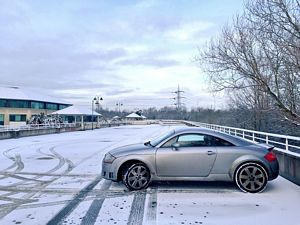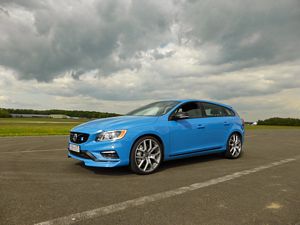|
By accessing or using The Crittenden Automotive Library™/CarsAndRacingStuff.com, you signify your agreement with the Terms of Use on our Legal Information page. Our Privacy Policy is also available there. |

What Car Is Best For Driving In The Winter?
|
|---|
|
|
What Car Is Best For Driving In The Winter?
Matthew Hubbard, Speedmonkey
13 January 2016
When you think of and admire a car you probably imagine yourself driving it on clear, dry roads with the sun in the sky and little traffic to get between you and driving nirvana.
But the reality, especially if you live in the northern hemisphere is much different. Most of the driving we do is to work and back and for a lot of the year we drive to work and back in the dark. Ugh.
To make matters worse the roads are usually wet and slippery. When it's not been actually raining the mud and rotting leaves that litter the roads during the winter months hold all the moisture they can and offer zero traction. When it's raining you can hardly see out of your grimy windscreen and if the sun does come out it does so at such an angle it blinds you so you still can't see.
And then there's the cold. I know the world holds many and varied horrors but not many can be as bad as getting into a freezing cold car on an utterly miserable morning. The windscreen is covered in condensation, the steering wheel is cold, any metal in the car (i.e. an Audi TT's gear knob) is literally freezing and you can't afford to breath because it steams up the windows.
Driving in winter is utterly horrible. But your choice of car can make all the difference.
I once commuted for a week in a Jaguar XFR-S. It was rear wheel drive and had so much power if the rear wheels could actually grip the ground they would have altered the speed of the earth's rotation. But the wheels couldn't grip because the week I drove it was in winter and the rear wheels gripped the road at 10% of throttle application only. Above that and they'd spin uselessly.
And to be honest all big, powerful rear wheel drive cars are pretty useless in such conditions.
Lighter rear wheel drive cars can be fun and controllable though. The winter proper has arrived in Sweden and @BuddaPSL is merrily driving his 200bhp rear wheel drive Subaru BRZ around.
She’ll be absolutely filthy again in about 10 minutes… #BRZ 🇸🇪 • pic.twitter.com/keaUTSsnGE
— Budda (@BuddaPSL) January 11, 2016
One thing you want in winter is a welcoming interior with great ambient lighting and heated seats that warm up quickly. My old Audi TT was heavier than the BRZ but had four wheel drive so it gripped well in any conditions. The interior was lovely and the leather seats heated quickly.
I drove my Lotus Elise to work the other day. The actual driving experience was epic. The chassis is so balanced and composed I was able to slide round corners without fear of losing control. Sadly the power of the heater is puny and I couldn't be bothered putting the roof on so my ears and nose had frozen solid by the time I got to work.
Front wheel drive cars work well in winter as long as they don't torque steer too much. Slippery conditions can aggravate even mild torque steer. My Volvo XC60 is a brilliant winter car but it does have a habit of losing grip at the front as I plant the accelerator coming out of a corner, or even on a grid cover or patch of mud or leaves if in a low gear in a straight line.
But otherwise the XC60 is almost perfect. It has a heated windscreen and heated seats. It has auto wipers and auto lights. In the darkness the interior is lit very subtly but very gorgeously. All the controls fall to hand and the seats are comfortable. You can set most things, including the heated front and rear windows and seats to come on at a certain level when you turn on the car.
Having driven almost every brand of car on sale in the UK today I'd say on balance Volvo makes the best cars for driving in winter, which is no surprise coming from a Swedish manufacturer. But the XC60 wouldn't be my favourite car for winter driving.
Sure you can get a four wheel drive XC60 which would alleviate the grip issues but it doesn't account for the car's weight - and where that weight is held. It's an SUV which means the car is relatively tall and that can make it a handful to drive in dark, wet, slippery conditions on roads with at least some corners.
It is this which rules out all Land Rovers and Range Rovers which have equally lovely and well lit and warm interiors.
My perfect car for winter driving is the Volvo V60 Polestar. It's got the Volvo interior and is perfectly suited for harsh winters. But the weight is low down, the engine is epic and the drivetrain is a hugely grippy four wheel drive system.
It might cost a fortune but if you have a spare fifty grand I couldn't recommend a better car for driving around in during the winter months.




















